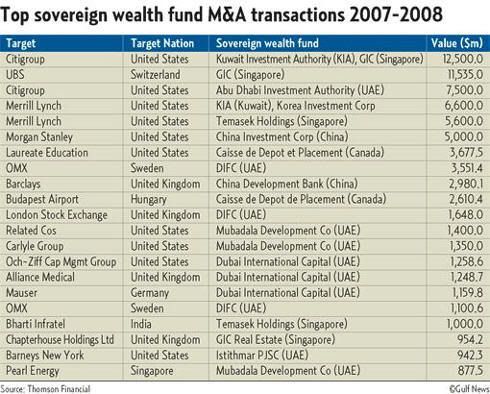Euro-Protectionism Has Fits Over SWFs

The world’s sovereign wealth funds will be asked to accept a voluntary code of conduct governing their investment activities under proposals poised for approval next week by the European Commission. Peter Mandelson, the European trade commissioner, said the code would set out basic standards of governance and transparency for the funds.
“The emphasis in their investments should be on commercial motivations, not national or strategic considerations. I think such a code is possible to draw up and would get acceptance from the wealth funds,” he told the Financial Times.
Similar voluntary guidelines are being prepared by the International Monetary Fund, which estimates there are more than 20 big state-backed funds that control between $1,900bn and $2,900bn in global assets.
Sovereign wealth funds from Abu Dhabi, China, Saudi Arabia and Singapore have injected billions of dollars into some of the world’s biggest investment banks since November. The funds provided vital liquidity for world financial markets but many politicians and elements of public opinion in the US and Europe remain worried about the implications of letting the funds acquire stakes in powerful companies and business sectors.
EU officials said the Commission’s proposals, which are due to be approved on Wednesday, would contribute to international efforts to set a framework for improving the openness and accountability of the funds. The proposals represent the 27-nation European Union’s first attempt at addressing the funds’ activities at EU level. They aim to balance concerns over the alleged lack of transparency and political motivations of certain funds with a message about Europe’s openness to foreign investment.
“We should be positive, not paranoid, about the operations of sovereign wealth funds,” Mr Mandelson said. “A voluntary approach is preferable to a statutory one. Otherwise we get into a divisive debate about enforcement and sanctions.” EU finance ministers are expected to discuss the Commission’s proposals on March 4. If the funds refuse to accept a voluntary code of conduct, pressure may grow for laws obliging them, at the least, to disclose their investments.
Well of course SWFs have political interests as well as economic ones in mind. How could it be otherwise for state-owned entities? Their whole existence is a policy choice. I have always though the need for SWF disclosure overblown. This may be the only time that I agree with one Richard Posner, but it's indeed true that foreign investment may be a welcome way to ensure that the governments behind these investments do not undertake monkey business because it's so much easier to expropriate their investments when they are on home soil. Yes, the context is the EU not the US, but the idea remains the same:
So again with the EU as with the US, to hell and back with this protectionist tomfoolery. Free trade is free trade is free trade: If the West wants to gain buy-in from the rest of the world for the free trade agenda, preventing SWF investment over dubious "transparency" provisos is, well, quite unfree. Bad show, Mandelson....the purchase of assets by foreign nations, even when they are hostile or potentially hostile to us, does not threaten [our] welfare or security. The purchase of a company from its owners places money in the hands of those owners that they can invest for a higher return--if they did not think they could do this, they would not sell the company. So such a purchase is wealth-enhancing. It does not undermine our national security just because the purchaser is a foreign government, but on the contrary enhances our security because the investment is a hostage...
By doing this they are giving hostages to the nations in which they invest. We should welcome the fact that these investments are less liquid than the short-term securities in which governments conventionally invest their reserves. The less liquid an asset, the better a hostage it is; it can't be withdrawn as rapidly.
1 comment:
European state-owned banks are not exactly a model for transparency, either. Maybe it would be more expedient for the EU to fix problems closer to home. See http://thedealsleuth.wordpress.com/2008/02/29/beware-of-litigious-state-owned-banks/
Post a Comment